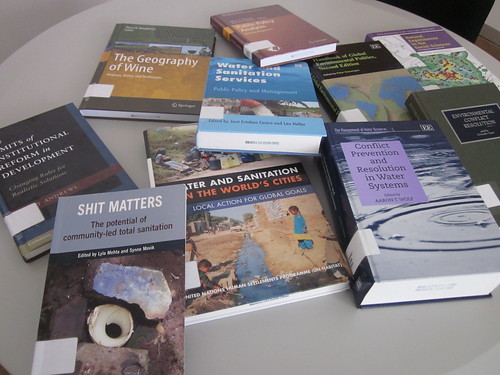I am a bookworm. I have always been. When I was a child, I catalogued my parents’ thousands of volumes using the Dewey decimal system. I know how to calculate a Cutter number. I know the Library of Congress system. And now that I’m old enough to be a professor, I am the representative of my campus to CIDE’s central library committee. I may not buy myself a Christmas present, but I’ll spend an entire month’s salary in books. I love reading, and I love the physicality of books.
This is me, not buying books at #ISA2016 pic.twitter.com/Cf88iq1INf
— Dr Raul Pacheco-Vega (@raulpacheco) March 19, 2016
This morning I tweeted a photograph that has taken a life of its own, where the main point is: we need to teach our students (and everyone, indeed) to learn how to use physical books, and more importantly, information literacy. In our current times, where thousands of people get their news from the internet (Twitter, Facebook, blogs), it’s more important than ever to learn how to use printed sources, and how to discern the validity of their content. But that requires a commitment to reading, not only skimming content. That also requires solid, well-stocked libraries.
One of many reasons why I insist my students should learn how to visit and use library resources. pic.twitter.com/exNMgU8OU3
— Dr Raul Pacheco-Vega (@raulpacheco) December 16, 2016
I have always worried about the state of public libraries. To me, having a solid public library is a clear example of a city where there is strong interest in literacy. I loved reading this ode to the public library by Maria Popova. The city where my parents live has, in my view, very few public libraries.
I find it kind of embarrassing that tiny towns like Bloomington have world-class libraries and Mexican cities don't pic.twitter.com/edAUVMbMt5
— Dr Raul Pacheco-Vega (@raulpacheco) December 17, 2015
My hometown, Vancouver, has one of the most amazing public libraries I have ever been to, in my life.
I used to live near two of their branches, Mount Pleasant and Riley Park (which sadly is now permanently closed). Local public libraries are fundamental not only to democracy and good government, but also to a strong social fabric. I love buying books and have a hard time giving them away, but if I am going to get rid of books, it’s only to give them to other libraries. For example, this summer I gave away hundreds of my books to libraries in my former university and the city where my parents live.
A really fun campaign (of which my good friends Kate Trgovac and Rosemary Rowe are part of) is the notion of the Little Free Library. They opened one at their home in East Vancouver in 2013. I also found out that University of Calgary Press donated lots of books to a number of Little Free Libraries in Calgary.
@raulpacheco Our pleasure! It's a fun campaign. We're going around to all our Little Free Libraries and adding our books to them 🙂 #yyc
— UCalgaryPress (@UCalgaryPress) July 20, 2016
I wish we had an initiative like this in Mexico. I’d be happy to be part of one, myself. Furthermore, as someone who does urban ethnography, I know very well that what Angela Clarke wrote here in 2013 still holds true: for many vulnerable people, libraries are safe havens. I hope we can protect them and push for more of them in the future. I don’t care how digital our world becomes, the printed word and libraries are, to me, sacred. And can you believe some people actually are AGAINST Little Free Libraries?
What's Wrong With a Little Free Library? https://t.co/FnMy1MR5fX cc @mynameiskate @rosemaryrowe good thing you're in Canada!!!
— Dr Raul Pacheco-Vega (@raulpacheco) December 19, 2015



0 Responses
Stay in touch with the conversation, subscribe to the RSS feed for comments on this post.